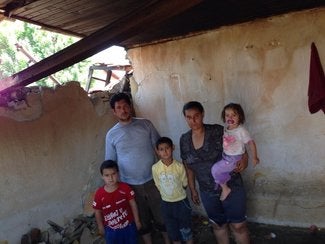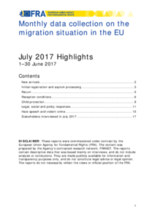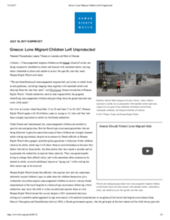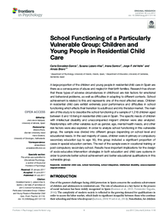

Displaying 301 - 310 of 527
This study investigated how adoptive and prospective adoptive parents in Spain deal with signs of fraud and corruption within the intercountry adoption process, illuminating the dismissal of the systemic failures of intercountry adoption and the rights of birth families.
This report from the European Union Agency for Fundamental Rights (FRA) provides data on migration throughout the EU from 1-30 June 2017. The report includes data on the child protection situation for migrant children, particularly the identification, emergency placement and accommodation of unaccompanied children.
Greek authorities on the island of Lesbos are inaccurately identifying and registering unaccompanied migrant children as adults upon their arrival, denying young people the care and protection they deserve.
This study measured the effectiveness of a Positive Parenting and Sensitive Discipline program for mothers and their 10- to 36-month-old children placed in parental residential care.
This study examined language and psychosocial skills of Greek institutionalized children in comparison to children of the same age brought up in family-based care.
language and psychosocial skills of Greek institutionalized children in comparis
This study describes the school functioning of a sample of 1,216 children aged between 8 and 18 living in residential child care in Spain. Results have important implications for the design of socio-educative intervention strategies in both education and child care systems in order to promote better school achievement and better educational qualifications in this vulnerable group.
This study examined the extent to which children and adolescents participated in decisions that affected them at the points of removal and reunification in the child protection process in Spain.
This report presents the findings from an assessment on the profile, drivers and intentions of refugee and migrant children who arrived in Italy and Greece in 2016 and 2017 and aims to enable Italian, Greek and European policy makers, local service providers and humanitarian actors to provide appropriate accommodations and services for migrant children.
On 20 June, the Advisory Group for Childonomics, a research projected intended to develop a tool to determine long-term social and economic return of investing in children, met in Brussels for its final meeting. The final output of the project in pilot countries Malta and Romania is scheduled to be presented at the International Foster Care Organisations (IFCO) World Conference in November 2017.
More than 1,000 asylum-seeking men and boys were living around Belgrade’s train station until their eviction in May. Now many of them, including hundreds of children traveling alone, are missing and vulnerable to trafficking in their desperation to reach northern Europe.





